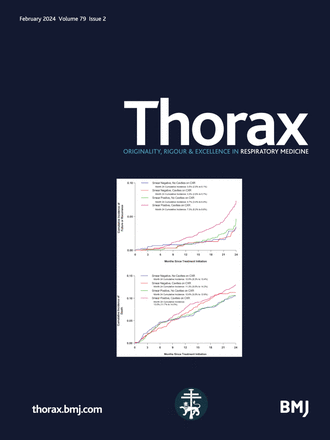Cytisinicline用于自我报告的COPD患者戒烟:ORCA-2和ORCA-3试验的事后分析
IF 7.7
1区 医学
Q1 RESPIRATORY SYSTEM
引用次数: 0
摘要
戒烟对于稳定和改善慢性阻塞性肺疾病(COPD)患者的呼吸功能至关重要。目的评价cytisinicline与安慰剂对有或无COPD吸烟者戒烟的疗效和安全性。方法:本事后分析使用了3期ORCA-2(正在进行的Cytisinicline治疗成瘾的研究)和ORCA-3双盲、安慰剂对照试验的综合数据。参与者接受6周或12周的胞昔霉素或安慰剂治疗。在1602名参与者中,145名(9.3%)自我报告COPD。干预措施:参与者每天接受3次3毫克的cytisinicline(6周:n=532; 12周:n=534)或安慰剂(12周:n=536),外加行为支持。结果:经生化验证,治疗后4周持续戒烟。结果COPD参与者年龄更大,吸烟时间更长,尼古丁依赖性更强。在COPD和非COPD亚组中,与安慰剂相比,Cytisinicline与更高的戒烟率相关。两组间治疗效果无统计学差异。在6周组中,COPD组戒烟率分别为17.3%和2.1% (OR 9.7, p=0.03),非COPD组戒烟率分别为19.3%和5.5% (OR 4.1, p<0.0001)。在12周组中,COPD组戒烟率分别为19.1%和4.3% (OR 5.3, p=0.04),非COPD组戒烟率分别为32.6%和8.6% (OR 5.2, p<0.0001)。Cytisinicline耐受性良好,无严重的治疗相关事件。结论Cytisinicline可显著提高COPD患者的戒烟率,且耐受性良好。研究结果支持cytisinicline作为COPD吸烟者戒烟的可行治疗方法。试验注册号为ORCA-2 ([NCT04576949][1])和ORCA-3 ([NCT05206370][2])。无数据。[1]: /查找/ external-ref ? link_type = CLINTRIALGOV&access_num = NCT04576949&atom = % 2 fthoraxjnl % 2恐惧% 2 f2025 % 2 f09 % 2 f17 % 2 fthorax - 2025 - 223880。atom [2]: /lookup/external-ref?link_type=CLINTRIALGOV&access_num=NCT05206370&atom=%2Fthoraxjnl%2Fearly%2F2025%2F09%2F17% 2f胸腔-2025-223880.atom本文章由计算机程序翻译,如有差异,请以英文原文为准。
Cytisinicline for smoking cessation in individuals with self-reported COPD: a post hoc analysis of the ORCA-2 and ORCA-3 trials
Importance Quitting smoking is essential for stabilising and improving respiratory function in people with chronic obstructive pulmonary disease (COPD). Objective To evaluate the efficacy and safety of cytisinicline versus placebo for cessation among smokers with and without COPD. Methods This post hoc analysis used combined data from the phase 3 ORCA-2 (Ongoing Research of Cytisinicline for Addiction) and ORCA-3 double-blind, placebo-controlled trials. Participants received 6 or 12 weeks of cytisinicline or placebo. Of 1602 participants, 145 (9.3%) self-reported COPD. Interventions Participants received 3 mg of cytisinicline three times daily (6 weeks: n=532; 12 weeks: n=534) or placebo (12 weeks: n=536), plus behavioural support. Outcome Biochemically verified continuous smoking abstinence during the last 4 treatment weeks. Results COPD participants were older, smoked longer and had greater nicotine dependence. Cytisinicline was associated with significantly higher smoking abstinence compared with placebo in both COPD and non-COPD subgroups. There was no statistical evidence of heterogeneity in treatment effect between arms. In the 6-week arm, quit estimates were 17.3% versus 2.1% (OR 9.7, p=0.03) for COPD and 19.3% versus 5.5% (OR 4.1, p<0.0001) for non-COPD. In the 12-week arm, quit estimates were 19.1% versus 4.3% (OR 5.3, p=0.04) for COPD and 32.6% versus 8.6% (OR 5.2, p<0.0001) for non-COPD. Cytisinicline was well tolerated with no serious treatment-related events. Conclusion Cytisinicline significantly increased quitting for smokers with and without COPD and was well tolerated. The findings support cytisinicline as a viable treatment for smokers with COPD who want to quit. Trial registration number ORCA-2 ([NCT04576949][1]) and ORCA-3 ([NCT05206370][2]). No data are available. [1]: /lookup/external-ref?link_type=CLINTRIALGOV&access_num=NCT04576949&atom=%2Fthoraxjnl%2Fearly%2F2025%2F09%2F17%2Fthorax-2025-223880.atom [2]: /lookup/external-ref?link_type=CLINTRIALGOV&access_num=NCT05206370&atom=%2Fthoraxjnl%2Fearly%2F2025%2F09%2F17%2Fthorax-2025-223880.atom
求助全文
通过发布文献求助,成功后即可免费获取论文全文。
去求助
来源期刊

Thorax
医学-呼吸系统
CiteScore
16.10
自引率
2.00%
发文量
197
审稿时长
1 months
期刊介绍:
Thorax stands as one of the premier respiratory medicine journals globally, featuring clinical and experimental research articles spanning respiratory medicine, pediatrics, immunology, pharmacology, pathology, and surgery. The journal's mission is to publish noteworthy advancements in scientific understanding that are poised to influence clinical practice significantly. This encompasses articles delving into basic and translational mechanisms applicable to clinical material, covering areas such as cell and molecular biology, genetics, epidemiology, and immunology.
 求助内容:
求助内容: 应助结果提醒方式:
应助结果提醒方式:


